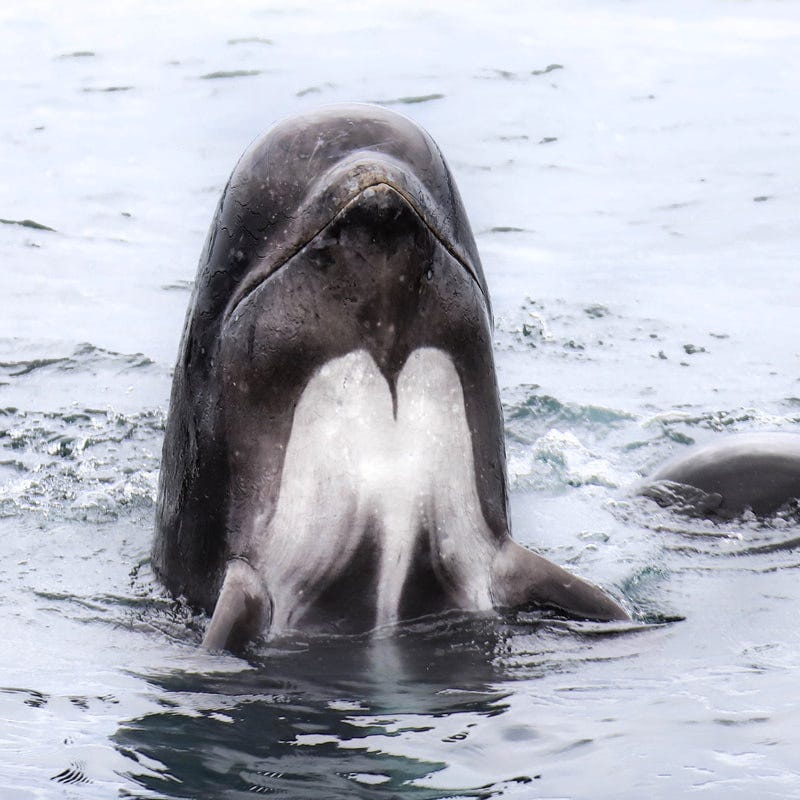Intermission: Unplugging to Recharge
And some thoughts on the importance of public interest journalism
Recently, one of my readers, who also happens to be a good friend, paid me the biggest complement about my work that I could ever wish to receive. She wrote: “I hoped that you’d be on this and help us to understand.” The comment was in response to the tragic story about the stranding of eleven long-finned pilot whales near Port Hood, Cape Breton Island. Eight died, but as a result of the valiant efforts of a group of teens who were later joined by many local residents, three of the whales were rescued from the rocky beach and returned to the sea. The image of one of the dead whales, sent to me by whale researcher Elizabeth Zwamborn, and posted as the cover photo for that piece, is both jarring and achingly beautiful and will be forever seared in my memory.
Image of a long-finned pilot whale. Courtesy Elizabeth Zwamborn and the Cape Breton Pilot Whale Project
When I embarked on this writing project—named after a line in a poem by Henry David Thoreau titled, “Walking,” in which he wrote, “Hope and the future for me are not in lawns and cultivated fields, but in the impervious and quaking swamps”—I was looking, frankly, for some hope. Journalism is at an existential cross-roads right now and public trust is plummeting. My trust is plummeting. If I were to point to one theme that has recurred in my reporting over the last 30 years it would be regulatory capture—essentially a form of corruption where political, industrial or ideological interests have undue weight in influencing policy. While journalism should be in the public interest, the mainstream/ corporate press have now become agents of our captured governments. It’s a complicated issue and I tried to explore it in the three-part series “Remote Control”—you can access all three parts from here. There is no question there is an important role right now for independent, thoughtful, responsible journalism.
I stand by every story I’ve ever written, but if ever I get something wrong, I’ll also be the first to admit there was an error made.
In starting this newsletter, I was also trying to steer clear of groupthink—which is pervasive now in many workplaces where people are afraid to speak up and raise obvious and legitimate questions and concerns. Self-censorship is not conducive to doing good journalism. I wanted to be able to ask legitimate questions in the public interest, freely, and as much as possible, present the nuance so as not to contribute to the growing polarization in our society.
Trying to make sense of a story—helping others to understand it—is a big part of this job, and something I take very seriously. It’s also what makes it the most interesting. It’s been just over a year since I began to promote this project, albeit reluctantly. Self-promotion has never come naturally or easily to me. But last June I turned on the paid subscription option and gulped. Many of you kindly stepped up with financial support and I want to thank you for doing that. If you continue to value this kind of reporting and analysis, please do consider renewing your subscription or if you haven’t already, taking out an annual or monthly subscription. It literally amounts to the cost of one fancy coffee a month!
I remain committed to keeping all my articles outside a paywall, so that they can be freely shared and read widely.
Thank you so much for all your valuable feedback and kind words of support. It really means the world to me.
There is one more story in the hopper before I take a break. Stay tuned for an upcoming full-length interview with Peter Victor, professor emeritus in Environmental Studies at York University who I’ve followed for years now. He’s a Canadian economist, whose ideas about managing our economy without growth have an important place in any discussion about what human activity is doing to the living world.
In “The Energy-emissions Trap,” a 2018 study he co-authored, Victor presented the following dilemma: We must reduce emissions in order to avoid run-a-way climate change, but this reduction will require that we manufacture renewable technologies, processes that will require fossil fuels. The energy-emissions trap results because “an insufficiently rapid transition to renewables will imply a scenario in which it is impossible to avoid either transgressing emissions ceilings or facing energy shortages.”
Victor has just published a new book, which we’ll take a look at in our upcoming interview.
I will also be keeping an eye on a couple very important stories I’ve been covering: the outcome of the Canadian Civil Liberties Association’s case in federal court involving the legality of the invocation of the Emergencies Act during the protests in Ottawa and elsewhere, as well as the results of the necropsies on the dead, stranded pilot whales in Port Hood, Cape Breton.
I’ll be in my studio for much of the summer throwing pots, but never too far away from my computer.
Stay tuned and have a wonderful summer!






I LOVE ❤️ LOVE your writing and content! Keep up the great work... and more articles 🙏👍❤️